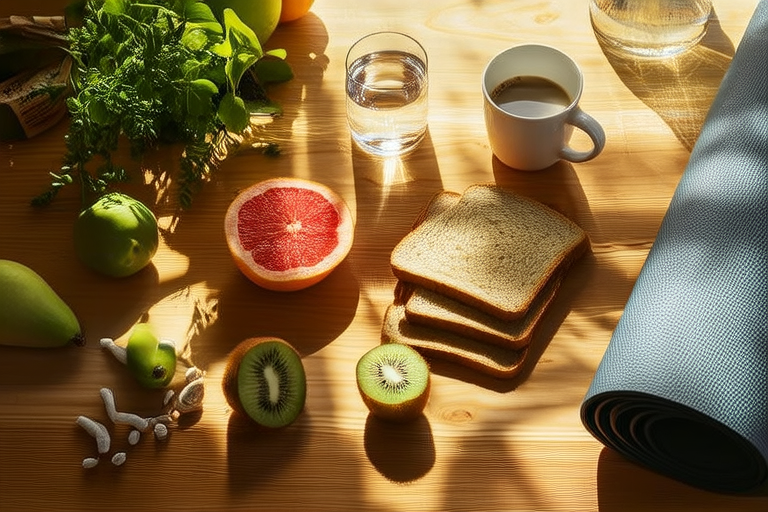Top 10 Lifestyle Habits for a Healthier, Happier You
In today’s fast-paced world, maintaining a balance between physical and mental well-being can feel like an uphill battle. However, adopting the right lifestyle habits can transform your health and happiness in profound ways. These habits not only help you feel better physically but also enhance your emotional resilience, allowing you to navigate life’s challenges with greater ease. Below, we explore ten essential habits that can lead to a healthier, happier you. Each habit is backed by practical tips and examples to help you integrate them into your daily routine.
1. Prioritize Quality Sleep
Sleep is the foundation of good health, yet it is often overlooked. Poor sleep can lead to fatigue, weakened immunity, and mood swings. To improve your sleep quality, establish a consistent bedtime routine. Aim for seven to nine hours of sleep each night and create a calming pre-sleep ritual, such as reading or meditating. Avoid screens at least an hour before bed, as blue light can disrupt your circadian rhythm. A dark, cool, and quiet bedroom environment can further enhance restfulness.
2. Stay Physically Active
Regular physical activity is crucial for both physical and mental health. Exercise boosts energy levels, strengthens muscles, and improves cardiovascular health. It also releases endorphins, which elevate mood and reduce stress. Incorporate movement into your day by taking short walks, using stairs instead of elevators, or trying activities like yoga or dancing. Aim for at least 150 minutes of moderate exercise per week, breaking it into manageable sessions if needed.
3. Eat a Balanced Diet
Nutrition plays a vital role in overall well-being. A balanced diet rich in fruits, vegetables, whole grains, lean proteins, and healthy fats provides essential nutrients for your body and brain. Limit processed foods, added sugars, and excessive caffeine. Practice mindful eating by savoring each bite and paying attention to hunger cues. Meal planning and preparing food at home can help you maintain healthier eating habits.
4. Stay Hydrated
Water is essential for nearly every bodily function, from regulating temperature to supporting digestion. Dehydration can cause headaches, fatigue, and difficulty concentrating. Carry a reusable water bottle and sip throughout the day. If plain water feels monotonous, infuse it with slices of lemon, cucumber, or mint for flavor. Monitor your urine color; pale yellow indicates proper hydration.
5. Practice Mindfulness and Meditation
Mindfulness involves being fully present in the moment without judgment. This practice reduces stress, enhances focus, and promotes emotional stability. Start with just five minutes of meditation daily, focusing on your breath or a calming visualization. Apps or guided recordings can help beginners. Throughout the day, pause to notice sensations, sounds, or emotions, grounding yourself in the present.
6. Cultivate Strong Social Connections
Human beings are inherently social creatures, and meaningful relationships contribute significantly to happiness. Spend time with loved ones, whether through shared meals, phone calls, or virtual meetups. Join clubs, volunteer, or participate in community events to meet new people. Prioritize quality over quantity in your relationships, nurturing those that bring joy and support.
7. Set Realistic Goals
Goal-setting provides direction and motivation, fostering a sense of accomplishment. Break larger objectives into smaller, actionable steps to avoid feeling overwhelmed. Use tools like journals or planners to track progress. Celebrate milestones along the way to stay motivated. Ensure your goals align with your values and passions, making the journey fulfilling rather than burdensome.
8. Limit Screen Time
Excessive screen time can negatively impact mental health, leading to eye strain, poor posture, and increased anxiety. Set boundaries by designating tech-free times or zones, such as during meals or before bed. Replace screen-based activities with hobbies like reading, crafting, or outdoor exploration. Use apps that monitor and limit your device usage to stay accountable.
9. Embrace Gratitude
Gratitude shifts your focus from what’s lacking to what’s abundant in your life, promoting positivity and resilience. Keep a gratitude journal, jotting down three things you’re thankful for each day. Reflect on these entries during tough times to remind yourself of life’s blessings. Express appreciation to others through kind words or small gestures, strengthening bonds and spreading positivity.
10. Learn to Manage Stress
Chronic stress harms both mind and body, increasing the risk of illnesses like heart disease and depression. Develop coping strategies tailored to your needs. Deep breathing exercises, progressive muscle relaxation, or engaging in creative outlets like painting or writing can alleviate tension. Identify stress triggers and address them proactively, seeking professional help if necessary.
Conclusion
Adopting these ten lifestyle habits can profoundly impact your physical and mental well-being, paving the way for a healthier, happier life. From prioritizing sleep and staying active to practicing mindfulness and embracing gratitude, each habit offers unique benefits that complement one another. Remember, change doesn’t happen overnight—start small and build gradually. Consistency is key, and even minor adjustments can yield significant results over time. By committing to these practices, you empower yourself to live a more balanced, fulfilling life, enhancing not only your own well-being but also positively influencing those around you.










